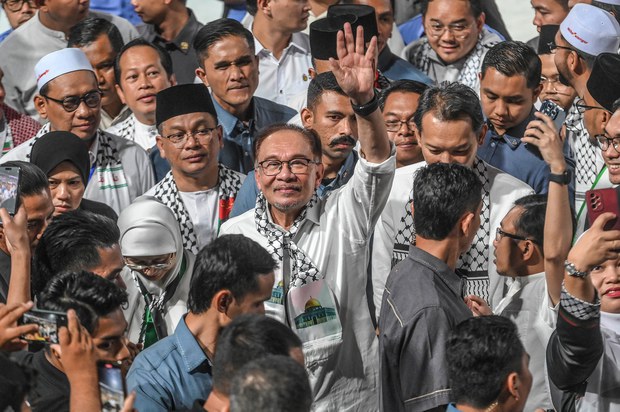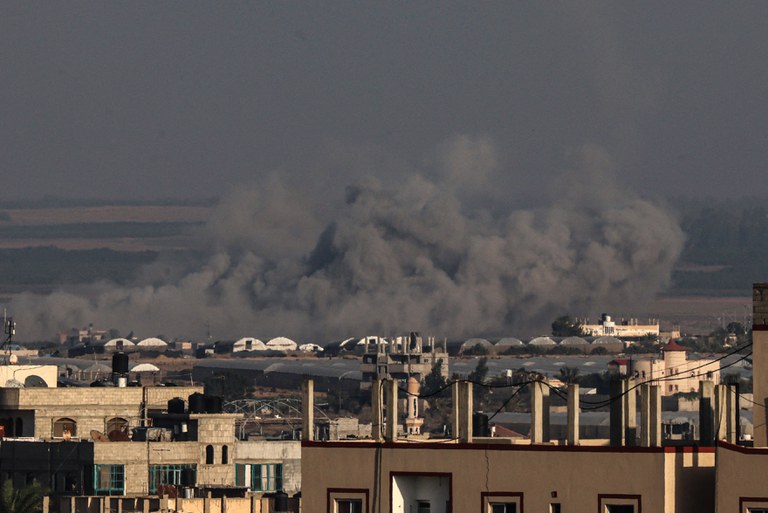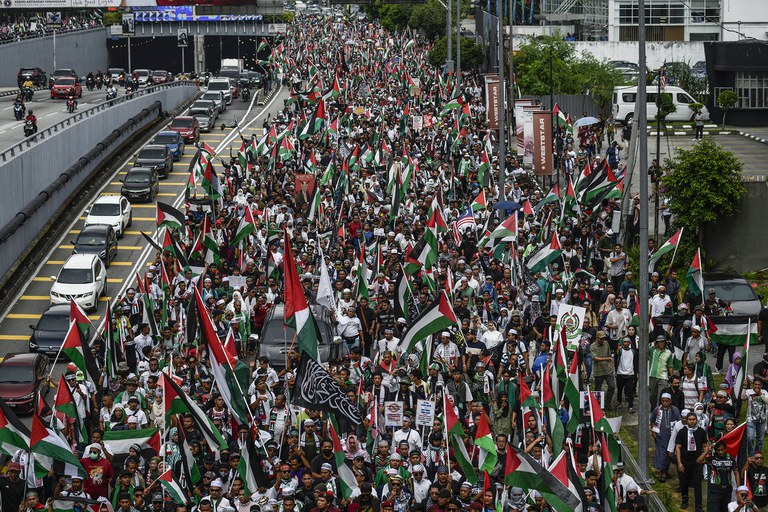Southeast Asia will see spillover effect from Israel’s Gaza War
2023.11.03
 Malaysian Prime Minister Anwar Ibrahim participates in a pro-Palestine rally at Stadium Axiata Arena, Bukit Jalil, Kuala Lumpur, Oct. 24, 2023.
Malaysian Prime Minister Anwar Ibrahim participates in a pro-Palestine rally at Stadium Axiata Arena, Bukit Jalil, Kuala Lumpur, Oct. 24, 2023.
Southeast Asia is already feeling the humanitarian, economic, and political fallouts after the Oct. 7 attacks by Hamas on southern Israel that killed more than 1,400 people.
Southeast Asians are among those who have been killed, taken hostage, or trapped in the Gaza Strip, where Israel has focused its retaliation by massively bombarding and laying siege to the Palestinian enclave.
There are no visible rifts yet in the ASEAN regional bloc, despite member-states Indonesia and Malaysia not having diplomatic relations with Israel, and some others enjoying close economic and security ties with the Jewish state.
Indeed, Southeast Asian nations and Persian Gulf leaders condemned “all attacks” on civilians as they called for Israel and Hamas to cease fire, during a summit in Saudi Arabia on Oct. 21.
Additionally, eight ASEAN states on Oct. 27 voted in favor of a U.N. General Assembly resolution for an Israel-Hamas ceasefire; only the Philippines abstained, while Cambodia was absent.
Diplomatic fallout
But Malaysia, which has long been supportive of Hamas and vocally so, has begun to feel the heat from the United States for not labeling the organization a terrorist group.
Malaysian Prime Minister Anwar Ibrahim has rebuffed American diplomatic pressure, but its pro-Hamas stance could run it afoul of Washington. On Nov. 1, the U.S. House of Representatives approved a bill to sanction Hamas supporters.
On Nov. 3, the Malaysian government said it was monitoring the progress of the bill, state news media reported.
Hamas members have been active in Malaysia. Palestinian engineer Fadi Mohamed Al Batsh, alleged to be a key player in Hamas’ weapons development, was assassinated by suspected Israeli operatives in April 2018, while another Palestinian was abducted in 2019, in what was believed to be another Mossad operation.
Controversially, former Prime Minister Mahathir Mohamad warmly welcomed the head of Hamas, Ismail Haniyeh, to Putrajaya in January 2020, despite Haniyeh’s terrorist designation by the U.S.
Malaysia has also been most vociferous in its condemnation of Israel. Anwar has refused to condemn Hamas’ attacks on Oct. 7, labeled Israel an “occupier,” and called its actions in Gaza “barbaric.”

As of Friday, more than 9,600 Palestinian civilians had been killed in Israeli airstrikes on Gaza, the Associated Press news agency reported, citing information from Gaza’s ministry of health.
Anwar, who is routinely attacked by the opposition for not sufficiently defending the rights of Muslims, has already traveled to the region to show solidarity with the Palestinians, and conferred with Turkey and other governments in searching for a ceasefire. Malaysia has condemned what they see as the hypocrisy of the West in supporting Ukraine’s right to defend itself, but not the right of the Palestinians.
Meanwhile, Indonesia and Malaysia have also stepped up their lobbying within the Organization of the Islamic Cooperation (OIC). Foreign ministry officials in Jakarta said Indonesia would send humanitarian aid to Gaza via Egypt starting Saturday. The Malaysian government announced on Oct. 11 announced that it would allocate 1 million ringgit (U.S. $211,423) in humanitarian aid for Palestinians.
Security impact
The threat of Southeast Asian militants traveling to Gaza or the West Bank is minimal. This is a tactical problem that security forces can manage.
There is a threat, however, of a revitalization of terror networks, renewed terror attacks, radicalization and fundraising for militant groups.
The violence in Gaza, in particular if there is a full-blown Israeli ground invasion or expansion of the war to include Hezbollah, a pro-Hamas Lebanese militant group, will serve as a catalyst for the disparate jihadist groups in Southeast Asia that are seeking both a cause and charismatic leader to rally around.
In Southeast Asia, the pro-Islamic State umbrella group, Jamaah Ansharut Daulah (JAD), and the pro-al-Qaeda Jemaah Islamiyah (JI) have both been weakened by arrests, neutralizations, and leadership decapitations. There is no clear leader of the militant movement in the region.
But as we saw in 2014, the rise of the Islamic State revitalized the weakened and fractious JI group in Indonesia, which hadn’t perpetrated a terror act since the 2011 bombing of a police mosque in Cirebon, Central Java.
The Islamic State’s declaration of a Caliphate gave Southeast Asian militants a cause to rally around, an opportunity to fight, train, and network. Most importantly, it allowed them to develop a very sophisticated social media campaign.
There is the added benefit that in Indonesia, Malaysia, the southern Philippines and elsewhere there is considerable public sympathy for the Palestinians, and traditionally Hamas had surprisingly high rates of public approval, as they are seen as freedom fighters and not a terrorist organization.

There are also concerns that Southeast Asian charities will be used to support Hamas and other militant groups. In February 2022, the U.S. sanctioned an Indonesian charity that allegedly had terrorist affiliations, World Human Care, for their work in Syria.
In Indonesia, security forces are already on edge about potential efforts by terrorist groups to disrupt the February 2024 general election and have lately arrested 59 suspects.
Pro-Palestinian rallies in Indonesia and Malaysia, are opportunities for recruitment and indoctrination to rebuild the depleted ranks of JAD and JI.
Philippine security officials are likewise fearful that the war will revitalize terrorist networks that have been gradually weakened in Mindanao and Sulu through sustained military operations.
In Thailand and the Philippines, where there have been Hamas and Hezbollah operations in the past, there is the added risk of attacks on Israeli tourists, synagogues, and Bangkok’s Chabad House.
Thai sentiment is both pro-Israeli and (again) increasingly anti-Muslim, which in turn is stoking fears of more sectarian tensions in the restive Deep South where separatist rebels operate.
In the Philippines, officials had in 2016-2018 disclosed Hamas preparations for attacks on Israeli and Jewish targets. In August 2017, Philippine authorities arrested an Iraqi bomb-maker who had previously worked as a “consultant” for Hamas in Syria.
Were the war to expand to include the Tehran-backed Hezbollah, Israel would likely feel compelled to target Iran’s interests. Should the United States fail to deter Iran, Tehran would be quick to employ its asymmetric forces. In March 1994, Hezbollah botched a terrorist attack on the Israeli embassy in Bangkok, prompting fears of similar operations should Tehran feel the need to retaliate.
A sustained and broadened conflict in the Middle East would impact Southeast Asia in ways they may not have countenanced.
Zachary Abuza is a professor at the National War College in Washington and an adjunct at Georgetown University. The views expressed here are his own and do not reflect the position of the U.S. Department of Defense, the National War College, Georgetown University or BenarNews.







